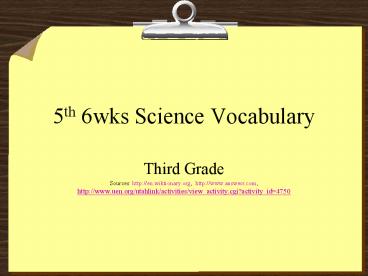5th 6wks Science Vocabulary - PowerPoint PPT Presentation
1 / 20
Title:
5th 6wks Science Vocabulary
Description:
A system formed by an ecological community and its environment that functions as ... Oxygen O 2 , - a colorless, tasteless, odorless gas that is 1/5 of the volume of ... – PowerPoint PPT presentation
Number of Views:53
Avg rating:3.0/5.0
Title: 5th 6wks Science Vocabulary
1
5th 6wks Science Vocabulary
- Third Grade
- Sources http//en.wiktionary.org,
http//www.answers.com, http//www.uen.org/utahli
nk/activities/view_activity.cgi?activity_id4750
2
environment
- The surroundings of, and influences on, a
particular item of interest. - The natural world or ecosystem.
3
ecosystem
- A system formed by an ecological community and
its environment that functions as a unit. - The interconnectedness of organisms (plants,
animals, microbes) with each other and their
environment.
4
habitat
- a specific place or natural conditions in which a
plant or animal lives.
5
organisms
- A discrete and complete living thing (creature,
plant or any other biota) that is composed of
organs.
6
animal
- A multicellular organism that is usually mobile,
whose cells are not encased in a rigid cell wall
(distinguishing it from plants and fungi) and
which derives energy solely from the consumption
of other organisms (distinguishing it from
plants). - A cat is an animal, not a plant.
7
plant
- An organism that is not an animal, especially a
organism capable of photosynthesis. Typically a
small or herbaceous organism of this kind, rather
than a tree.
8
survival
- The fact or act of surviving continued existence
or life. - His survival in the open ocean was a miracle he
had fully expected to die.
9
inherited traits
- The genetic transmission of characteristics from
parent to offspring. - The sum of characteristics and associated
potentialities transmitted genetically to an
individual organism.
10
physical environment
- The surroundings (habitat) in which a plant or
animal exist.
11
oxygen
- Oxygen O 2 , - a colorless, tasteless, odorless
gas that is 1/5 of the volume of the atmosphere
and required for plant and animal life
12
water
- A clear liquid drinkable by humans and animals
the chemical H2O, hydrogen oxide.
13
food
- Any substance which can be consumed by living
organisms in order to sustain life, especially
that which can be eaten. - The innkeeper brought them food and drink.
14
space
- An area or volume of sufficient size to
accommodate a person or thing. - They reserved a space for him to park his car.
- Write your name in the space below.
15
environmental changes
- Environmental change refers to variation in the
environment (either natural or man made)
resulting in a difference.
16
adaptations
- Animals depend on their physical features to help
them obtain food, keep safe, build homes,
withstand weather, and attract mates. These
physical features are called physical
adaptations. Physical adaptations do not develop
during an animal's life but over many
generations.
17
characteristics
- being a distinguishing feature of a person or
thing
18
species
- A group of plants or animals having similar
appearance. - This species of rock is unique to the area
19
survive
- Of a person, to continue to live to remain
alive. - Of an object or concept, to continue to exist.
20
reproduce
- (biology) to generate offspring (sexually or
asexually) - to produce again to recreate































